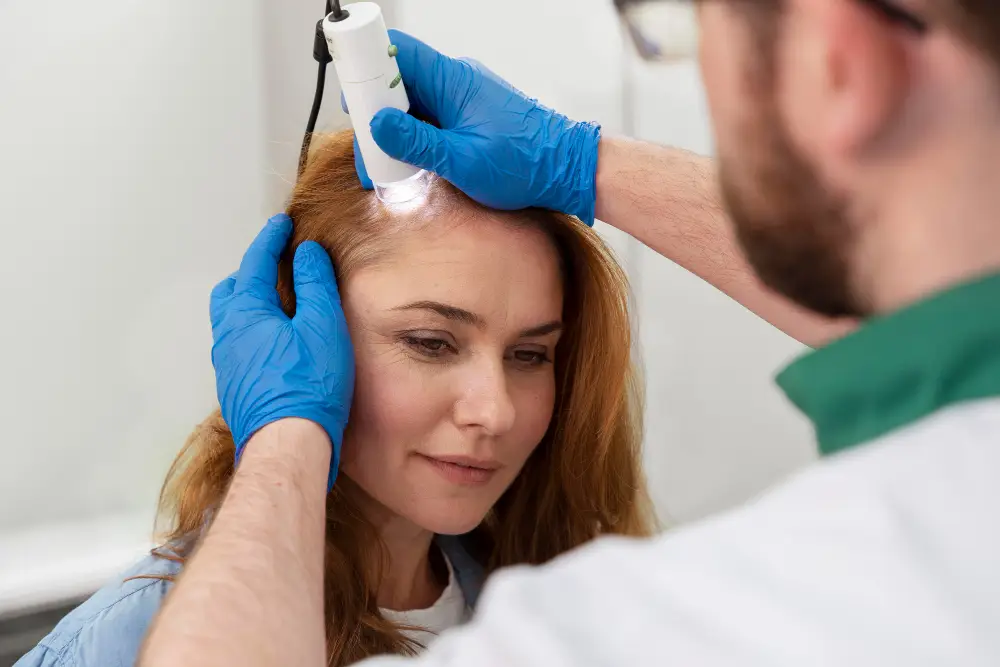
Stem Cell Treatment for Crohn’s: Navigating Advanced Pathways in Pereira, Colombia
Key Takeaways for Navigating Crohn’s Disease Options
- Understanding Crohn’s is crucial: It’s a chronic, inflammatory bowel disease impacting quality of life.
- Conventional treatments often manage symptoms but may not address underlying issues for all patients.
- Advanced pathways, including certain regenerative approaches, are being explored for their potential in immune modulation and tissue repair, particularly for refractory cases and perianal fistulas.
- Pereira, Colombia, offers a patient-centric environment with established medical infrastructure and regulatory oversight (INVIMA) for advanced therapies.
- Considering these pathways requires a clear, informed approach. A confidential case review can provide personalized insights and address specific questions about suitability and logistics.
Introduction: Seeking Clarity Amidst Chronic Crohn’s
Living with Crohn’s disease often feels like an ongoing battle, marked by persistent discomfort, unpredictable flares, and the exhausting search for lasting relief. If you’ve reached a point where conventional approaches no longer offer the stability or quality of life you desire, you’re not alone. Many individuals worldwide are exploring advanced pathways, including the potential of regenerative medicine, to address the complexities of this chronic condition.
At Regencord, located in the vibrant city of Pereira, Colombia, our mission is to provide clear, educational resources that empower you to make informed decisions about your health journey. We understand the emotional and physical toll Crohn’s can take, from the pain and fatigue to the social limitations. Our patient advocacy team is here to guide you through understanding the scientific landscape of options, helping you explore whether advanced regenerative strategies, such as those involving stem cells for immune modulation, perianal fistula closure, or gastrointestinal repair, might be a suitable consideration for your refractory Crohn’s disease.
This comprehensive guide delves into the current understanding of Crohn’s, the scientific basis for certain advanced regenerative pathways, and the distinct advantages of considering care in Pereira, Colombia. We aim to equip you with verifiable information, addressing common concerns and outlining a clear path forward.
The Stakes & Critical Implications of Crohn’s Disease

Crohn’s disease, a type of inflammatory bowel disease (IBD), is a chronic condition causing inflammation of the digestive tract. This inflammation can lead to a range of debilitating symptoms, including abdominal pain, severe diarrhea, fatigue, weight loss, and malnutrition. The impact of Crohn’s extends beyond physical symptoms, significantly affecting a person’s mental health, social life, and overall productivity.
The disease can affect any part of the gastrointestinal (GI) tract from mouth to anus, but it most commonly affects the small intestine and the beginning of the large intestine. Complications can be severe, ranging from strictures and obstructions requiring surgery to the development of perianal fistulas—painful tunnels that connect the intestine to the skin around the anus, often requiring complex management. According to the U.S. National Institutes of Health (NIH), a significant percentage of Crohn’s patients will develop perianal fistulas, which are particularly challenging to treat effectively with conventional methods.
The chronic and often progressive nature of Crohn’s means a lifelong journey of symptom management, with many individuals facing the prospect of multiple medications and surgical interventions. This continuous struggle often leads to profound frustration and a desire for innovative approaches that might offer more sustained relief or support for the body’s natural healing processes.
The Conventional Approach in Colombia for Crohn’s Management

In Colombia, as in many parts of the world, the management of Crohn’s disease typically follows established clinical guidelines focused on reducing inflammation, alleviating symptoms, and preventing complications. The Colombian Ministry of Health and Social Protection (Ministerio de Salud y Protección Social) oversees healthcare standards, ensuring that conventional treatments are available and regulated.
First-line therapies generally include anti-inflammatory medications, such as aminosalicylates, and corticosteroids for active flares. Immunomodulators (e.g., azathioprine, methotrexate) are often used for long-term management to suppress the immune system’s overactivity. For moderate to severe Crohn’s, biologic therapies (e.g., anti-TNF agents) have become a cornerstone of treatment, targeting specific proteins involved in the inflammatory process. While these treatments can be highly effective for many, some patients experience diminishing returns, develop side effects, or have refractory Crohn’s disease, meaning their condition does not respond adequately to conventional therapies.
Surgical interventions are also a common part of the Crohn’s journey, particularly for complications like intestinal strictures, obstructions, or perianal fistulas that do not respond to medication. While surgery can provide temporary relief, it is not a solution for the underlying disease process, and recurrence is a common concern. For complex conditions like perianal fistulas, even surgical interventions can have high recurrence rates, leading many to seek alternative or complementary pathways.
The regulatory body, INVIMA (National Food and Drug Surveillance Institute of Colombia), plays a crucial role in overseeing the approval and safety of pharmaceutical products and advanced biological therapies within the country, ensuring that all medical practices adhere to national and international standards. This robust oversight provides a framework for both conventional and advanced medical care within Colombia.
The Pereira, Colombia Advantage: A New Perspective on Advanced Care

For patients considering advanced pathways for Crohn’s disease, the choice of location for care is as significant as the treatment itself. Pereira, Colombia, is emerging as a compelling destination, offering a unique blend of high-quality medical infrastructure, compassionate care, and a supportive environment.
A Hub for Advanced Regenerative Medicine
Colombia has invested significantly in its healthcare sector, with advanced medical facilities and highly trained professionals. Pereira, in particular, benefits from this growth, housing clinics and laboratories dedicated to regenerative medicine. This includes adherence to stringent regulatory standards set by INVIMA for the handling and application of biological products, aligning with international best practices. The focus here is on leveraging the body’s natural capacity for repair and modulation through carefully considered, evidence-supported pathways.
Patient-Centricity and Holistic Support
Our experience at Regencord has shown that patients often arrive overwhelmed by complex, multi-layered treatment histories, seeking not just a treatment but a renewed sense of control and clarity in their health journey. Pereira offers a setting where this re-empowerment is prioritized, from the initial consultation to post-procedure support, distinguishing it from fragmented care models. Our patient advocacy team provides comprehensive logistical support, handling travel, accommodation, and local navigation, allowing you to focus entirely on your healing. This integrated approach minimizes stress and maximizes the potential for a positive experience.
The Healing Environment of Pereira
The journey for international patients extends beyond the clinical setting; it encompasses cultural immersion and ease of access. Nestled in the heart of Colombia’s coffee region, Pereira boasts a mild climate, lush natural landscapes, and a warm, welcoming culture. This calming environment can be incredibly beneficial for recovery, offering a peaceful backdrop that positively impacts the holistic recovery experience, a factor often overlooked in high-pressure medical environments elsewhere. The city’s growing medical tourism infrastructure ensures comfort and convenience, with modern amenities readily available.
Transparency and Ethical Practice
Patients seeking advanced Crohn’s care are often at a crossroads, having exhausted conventional options. What they truly seek is not just a “cure,” but clarity, validated information, and a genuine, ethical pathway forward. Pereira, with its commitment to transparent, patient-centric regenerative medicine and a robust regulatory framework, provides a unique ecosystem where this hope can be responsibly nurtured. This contrasts sharply with environments where information can be ambiguous, leaving patients feeling more confused than empowered.
Regencord’s Pathway Navigator: Your Guide to Advanced Crohn’s Care

To help you navigate the complexities of advanced treatment options for Crohn’s disease, we have developed Regencord’s Pathway Navigator: Your Guide to Advanced Crohn’s Care. This practical resource is designed to clarify the patient journey, answer critical questions, and help you understand if these innovative pathways are right for you.
What the Pathway Navigator Helps You With:
- Understanding the Science: Demystifies how regenerative approaches, including specific stem cell applications, aim to support immune modulation and tissue repair in Crohn’s.
- Assessing Suitability: Provides a self-assessment checklist to help you consider if you might be a candidate for these advanced options, based on your medical history and current condition.
- Logistical Preparation: Offers a step-by-step guide to preparing for international medical travel, from initial contact to post-procedure follow-up, ensuring a smooth and stress-free experience.
- Question Prompts: A list of key questions to ask during your confidential case review, ensuring you gather all the information you need to make an informed decision.
- Resource Links: Curated links to authoritative resources (like the NIH or PubMed) for further reading on the science behind these pathways.
This tool is an integral part of our commitment to patient empowerment, ensuring you have clear, actionable information at every stage of your decision-making process.
Our Regenerative Philosophy & Approach for Crohn’s Support

At Regencord in Pereira, Colombia, our philosophy is rooted in understanding the body’s inherent capacity for healing and modulating its own systems. When considering advanced pathways for Crohn’s disease, our approach is educational and supportive, focusing on strategies that aim to assist the body in its efforts to achieve balance and repair.
Focus on Immune Modulation and Tissue Repair
The core of Crohn’s disease lies in a dysregulated immune response that leads to chronic inflammation. Advanced pathways, particularly those involving mesenchymal stem cells (MSCs), are being explored for their potential to help modulate the immune system, thereby potentially reducing inflammation. A study highlighted by the NIH, for instance, suggests that MSCs possess immunomodulatory properties that can influence the inflammatory environment associated with Crohn’s disease, shifting it towards a more anti-inflammatory state.
Furthermore, for specific complications like perianal fistulas, the regenerative capacity of certain cell-based approaches is of particular interest. Clinical trials listed on PubMed and ClinicalTrials.gov have investigated the direct application of stem cells to promote the closure of these challenging fistulas, a condition that often proves refractory to conventional medical and surgical interventions.
A Non-Promissory, Evidence-Informed Perspective
It is critical to understand that our approach is not about offering guarantees or asserting unverified clinical superiority. Instead, it is about carefully evaluating each patient’s unique situation and discussing whether specific regenerative strategies, supported by a growing body of scientific literature, could be a suitable pathway to explore. We emphasize the importance of rigorous patient selection and a comprehensive understanding of the current evidence, ensuring that all decisions are informed and ethical.
Our team at Regencord in Pereira, Colombia, focuses on education and transparent communication. We believe in presenting the current scientific understanding, the mechanisms of action for regenerative approaches in the context of Crohn’s (such as immune modulation, support for gastrointestinal repair, and perianal fistula closure), and what you can realistically expect from such a journey. This empowers you to make a choice grounded in clarity, rather than speculation.
Overcoming Common Hesitations: Why Seeking Clarity is a Strategic Advantage
Considering innovative pathways for a chronic condition like Crohn’s often comes with a set of understandable hesitations. Many patients feel frustrated by past treatment experiences, concerned about safety, logistical challenges, or financial implications. Let’s address some of these common psychological barriers and clarify how seeking information can transform uncertainty into informed action.
Hesitation 1: “Stem cell treatment sounds too experimental or unproven for Crohn’s.”
Addressing the Concern: It’s natural to be cautious about new approaches, especially when your local doctors may not have discussed them. However, it’s important to differentiate between unregulated, unproven therapies and those underpinned by substantial scientific research. The potential of mesenchymal stem cells (MSCs) for Crohn’s, particularly for immune modulation and perianal fistula closure, is an active area of investigation with many clinical trials registered on platforms like NIH and PubMed. Our approach focuses on specific applications where evidence is accumulating, guided by ethical considerations and regulatory oversight from bodies like INVIMA in Colombia. We present these as potential pathways grounded in biological principles, not “miracles,” and aim to educate on the science without making unsubstantiated claims.
Hesitation 2: “Traveling to Colombia for medical care seems daunting and potentially unsafe.”
Addressing the Concern: The idea of international medical travel can evoke concerns about safety, quality, and logistics. However, Colombia, and specifically Pereira, has a robust and growing medical tourism infrastructure. The Colombian Ministry of Health and INVIMA ensure high standards for medical facilities and treatments. Our patient advocacy team at Regencord transforms the perceived complexity into a guided, seamless experience. From assisting with travel arrangements and accommodation to providing local support and translation services, we ensure that your focus remains on your health, not on the administrative burdens. We emphasize the secure, modern environment of our facilities and the warmth of Colombian hospitality, turning a daunting prospect into a supported journey.
Hesitation 3: “I’ve tried so many treatments for my Crohn’s, and nothing has truly worked. Why would this be different? I don’t want false hope.”
Addressing the Concern: We deeply understand the frustration and exhaustion that comes from a history of unsuccessful treatments for refractory Crohn’s. Our goal is not to offer false hope or “guaranteed” outcomes, but to present a different *pathway*—one that leverages advanced understanding of regenerative biology to support the body’s own immune system and healing processes. A confidential case review with our team is an opportunity for a comprehensive, personalized evaluation. We help you understand if your unique condition makes you a suitable candidate for these advanced strategies, providing clarity and a realistic perspective. This empowers you to make an informed decision, moving beyond the cycle of disappointment towards a strategic and educated choice for your future well-being.
Hesitation 4: “The cost of international medical care, combined with travel, feels overwhelming and out of reach, especially if insurance won’t cover it.”
Addressing the Concern: Financial considerations are a significant and valid concern. We believe in complete transparency. Our process includes a detailed discussion of potential pathways and their associated costs during your confidential case review, ensuring no hidden fees. While insurance coverage for advanced therapies can vary, many patients find that the comprehensive nature of care and the potential for long-term improvement in quality of life represent significant value. We encourage patients to consider the total value proposition, including the dedicated support system and focused attention often not available in conventional, high-volume healthcare settings. Investing in a thorough evaluation of options is a strategic step towards understanding all possibilities.
Glossary of Key Terms for Crohn’s & Regenerative Medicine
- Crohn’s Disease: A chronic inflammatory bowel disease (IBD) that causes inflammation of the digestive tract, which can lead to abdominal pain, severe diarrhea, fatigue, weight loss, and malnutrition.
- Refractory Crohn’s Disease: Crohn’s disease that does not respond adequately to conventional medical treatments, often leading to a search for alternative or advanced pathways.
- Perianal Fistula: A common complication of Crohn’s disease, involving an abnormal tunnel connecting the rectum or anus to the skin around the anus, often requiring complex management.
- Immune Modulation: The process of adjusting or regulating the body’s immune response to either suppress an overactive immune system (as in autoimmune conditions like Crohn’s) or enhance it.
- Gastrointestinal Repair: The process of restoring integrity and function to the tissues of the digestive tract that have been damaged by chronic inflammation, such as in Crohn’s disease.
- Mesenchymal Stem Cells (MSCs): A type of adult stem cell found in various tissues, known for their immunomodulatory and regenerative properties, making them a subject of interest for conditions involving inflammation and tissue damage.
- INVIMA (National Food and Drug Surveillance Institute of Colombia): The Colombian regulatory agency responsible for the oversight of medicines, biological products, and medical devices, ensuring their quality and safety.
Frequently Asked Questions About Stem Cell Treatment for Crohn’s
What is stem cell treatment for Crohn’s, and how might it help?
Stem cell treatment for Crohn’s disease, particularly using mesenchymal stem cells (MSCs), is an advanced pathway being explored for its potential to modulate the immune system and promote tissue repair. For example, for perianal fistulas, MSCs have been studied for their ability to promote closure. For broader gastrointestinal inflammation, the immunomodulatory properties of MSCs are thought to help reduce the inflammatory response associated with Crohn’s. The NIH and numerous PubMed-indexed studies provide insights into these mechanisms.
Is this a “cure” for Crohn’s disease?
It is important to emphasize that there is currently no definitive “cure” for Crohn’s disease. Advanced pathways, including regenerative strategies, aim to support the body’s natural processes, reduce symptoms, promote healing, and improve quality of life. Our educational focus is on offering innovative avenues for managing and potentially improving the condition, not on making claims of a complete eradication of the disease.
How is the safety of stem cell treatments ensured in Colombia?
In Colombia, advanced biological therapies, including those involving stem cells, are regulated by INVIMA (National Food and Drug Surveillance Institute of Colombia). This regulatory body ensures that facilities adhere to strict standards for processing, handling, and administering these therapies. Regencord partners with facilities that comply with these national regulations, prioritizing patient safety and ethical practices. The Colombian Ministry of Health also sets national healthcare standards.
What does “immune modulation” mean in the context of Crohn’s disease?
Immune modulation refers to the process of adjusting or regulating the body’s immune system. In Crohn’s disease, the immune system is overactive and attacks the digestive tract. Certain regenerative approaches, such as those involving MSCs, are being researched for their ability to help calm this overactive immune response, shifting it towards a more balanced, anti-inflammatory state. This does not suppress the entire immune system but aims to re-balance its activity.
What is the typical patient journey like when seeking care through Regencord in Pereira?
The patient journey begins with a confidential case review, where our team evaluates your medical history and discusses potential pathways. If you are deemed a suitable candidate, we then assist with all logistical aspects of travel to Pereira, including accommodation and local navigation. Once here, you would undergo the recommended evaluations and the therapeutic pathway. Throughout your stay and during your follow-up, our patient advocacy team provides continuous support, ensuring a seamless and supportive experience. This comprehensive approach is detailed in our “Regencord’s Pathway Navigator: Your Guide to Advanced Crohn’s Care.”
Your Next Step: Discovering Your Potential Pathway
If you or a loved one are exploring advanced options for Crohn’s disease, especially for conditions like refractory Crohn’s or perianal fistulas, the team at Regencord in Pereira, Colombia, is here to provide clarity.
Contact us for a confidential case review to discuss your specific situation and understand if you are a candidate for the regenerative medicine pathways available. Our patient advocacy team is ready to guide you towards an informed decision.



